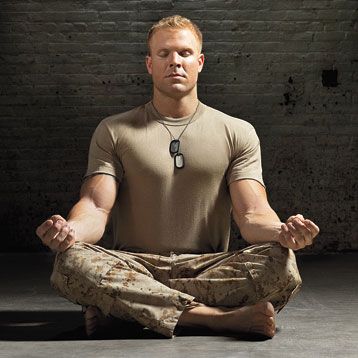A promising new bill aims to expand access to holistic healthcare services for US military veterans.
Called the Expanding Care for Veterans Act (H.R. 4887), the bill was introduced into the House of Representatives earlier this year by Congresswoman Julia Brownley (D-CA). Should it pass, the bill will require the Department of Veterans Affairs to conduct research and develop a comprehensive plan for including complementary and alternative medicine (CAM) among its medical services currently provided to veterans.
The bill would establish a three-year program to “assess the feasibility and advisability” of integrating of CAM within VA medical centers. It  would also evaluate wellness programming as a complementary approach to mental health care for veterans and their family members.
would also evaluate wellness programming as a complementary approach to mental health care for veterans and their family members.
Additionally, Brownley’s bill calls for the education of healthcare professionals at the VA, which would include training on the effectiveness of various CAM therapies and their integration into mainstream treatment. It would also require the Department to study the barriers to holistic services encountered by veterans, as well as by practitioners and healthcare administrators in the VA system.
Growing Openness
The Expanding Care for Veterans Act is, in part, a response to veterans’ growing openness to non-conventional healing modalities. Over the past decade, the use of CAM at the VA has increased steadily. According to a 2011 report, “about 9 in 10 VA facilities provide CAM therapies or refer patients to licensed practitioners.”
According to the VA, veterans most commonly use CAM for stress management and to promote general wellness. Practitioners working within the VA also employ CAM therapies to treat posttraumatic stress disorder (PTSD), depression, back pain, headache, arthritis, fibromyalgia, and substance abuse. Currently, the most commonly utilized CAM therapy among veterans is meditation.
Advocates argue that within veteran populations, “where rates of psychological disorders, debilitating injuries and lack of social support are higher than civilian populations,” conventional medicine alone is, “often insufficient to treat these illnesses and resulting symptoms” (Trumble et al. J Alt Comp Med. 2014; 20(5): A50). Consequently, many veterans have sought alternative treatments outside of the VA system, most often to meet mental healthcare needs.
Rep. Brownely hopes that her new bill will enhance, reinforce, and potentially replace more traditional mainstream therapies.
“We must find more and better ways to provide our veterans with the mental health care they need,” she urged in a recent press release. “I believe we need to evaluate what works, and when it does, find a way to provide those therapies to our veterans who are in need.”
END







